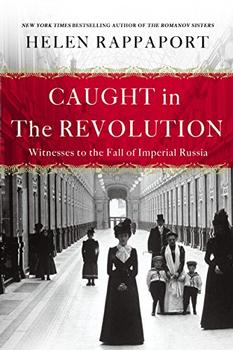Page 4 of 4
There are currently 25 member reviews
for Caught in the Revolution
-
Victoria
Caught in the Revolution
The author, Helen Rappaport, has written a well researched book about the start of the Russian revolution from the viewpoint of the ex-pat community living in Petrograd.
Although a good entrée into this period of history, if I had more knowledge about it the book would have been more enjoyable. It was a fairly easy read for a historical book which was somewhat of a surprise.
This is the first book I've read by the author but it won't be the last.
-
Becky H. (Chicago, IL)
The details of revolt and chaos
The lives of the diplomats, journalists, ordinary citizens and foreign expats who lived through 1917 in Petrograd (now St. Petersburg), Russia as it fell from Tsarist rule to peasant's revolt to anarchy to Leninism is told in exacting detail by Rappaport. Her clear and compelling writing makes this journey into disaster and terror real and immediate. She is able to carry the reader into the unease that slowly begins to develop into the "practically bloodless" and often times polite early revolution and that then descends into chaos and horror as beatings, death, starvation and cold blooded murder escalate.
As well written as it is researched, the book is surprisingly easy to read. The many (nearly 100) pages of notes will fascinate those of a more scholarly bent. I just enjoyed the clear writing and minute by minute detail. This isn't a book for everyone, but anyone with an interest in Russia or revolution or world history will appreciate this book.
-
Suzanne G. (Tucson, AZ)
Revolution Action
This would be the go-to nonfiction book for anyone wanting to learn the observations of foreigners living in Petrograd, Russia during the 1917 Revolution. The extensive research is vividly viewed with a timeline representing the progress of the experiences of these personalities.
Before attempting to read such a publication, it would help to have prior understanding of the history of the players and circumstances in such an uprising. I feel I might have grasped more had I spent time familiarizing myself with that. The book flowed and was interestingly written.
-
Katherine P. (Post Mills, VT)
Exhaustive and Exhausting
A long book that was as chaotic and confusing as the events it portrayed. Difficult to read because of excessive repetition of place names and numbers of people marching, shouting, killing, looting, starving, raving, randomly shooting and then seemingly returning to " normal " before starting all over again. The narrative is interspersed with quotes from various observers of the actions during the February 1917 uprising followed by observations during the finality of the October revolt. Most of the observations are either by Red leaning foreign correspondents and photographers sent by their publications to report on the events, or by people on a mission to " help " one faction or another such as Mrs Pankhurst come to organize the Russian women who have now achieved freedom. There are also letters between diplomats and their governments or letters to family back home.
So many questions--where are the young girls displaced from the elegant Smolny Institute? Were they murdered --were their bodies among the many described as fallen on the street or in the hallways of various palaces? How is it that the streets are swollen with soldiers who left the front ( there is after all a war going on) yet other trains are headed to the front with soldiers? Where are the trucks laden with food and arms coming from and where did the food go if people are lined up in the streets listlessly waiting for food at the shops? How does one determine that there are thousands marching in the streets and not hundreds? With all the shooting and so many loose canons among these throngs how is it that in one instance there are only seven killed, in another only eleven?
One thing for certain--there was chaos and anarchy. The only ones doing any successful planning were the Bolsheviks, even with struggles for power within the ranks. The resentment against money was great and reminds me of the present day criticism of the 1 in general and the Koch Brothers in particular. Also similar, demands for higher wages and less work--increases to three and four times their wages and reduction to a four hour work day was not sufficient to satisfy these revolutionaries. Murder, rape, looting were all on the rise--rape on college campuses, ambush of policemen sitting in patrol cars, looting and riots in the streets--all very familiar.
But, one must wonder, is the result of the Russian Revolution--suppression of speech and religion, total central government control --to be the result here, too? And if that comes, will it happen in the span of less than a year? 2017 is the publication date of this book, to mark the centennial of that Revolution--will it mark, with a new President, no matter which, the beginning of ours?
